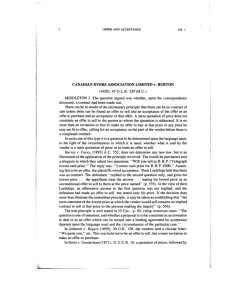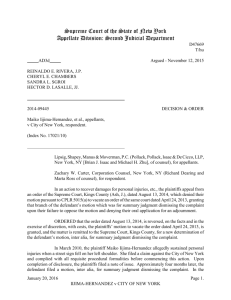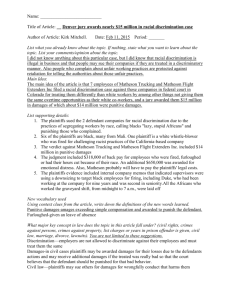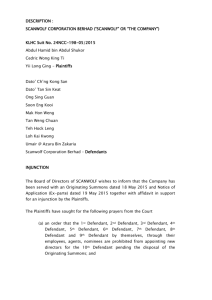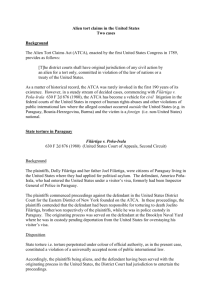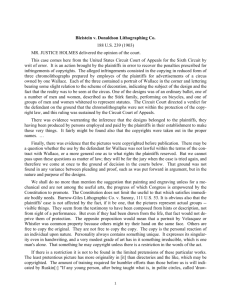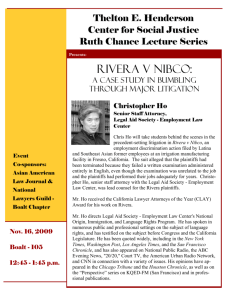DALAM MAHKAMAH TINGGI MALAYA DI JOHOR BAHRU DALAM
advertisement
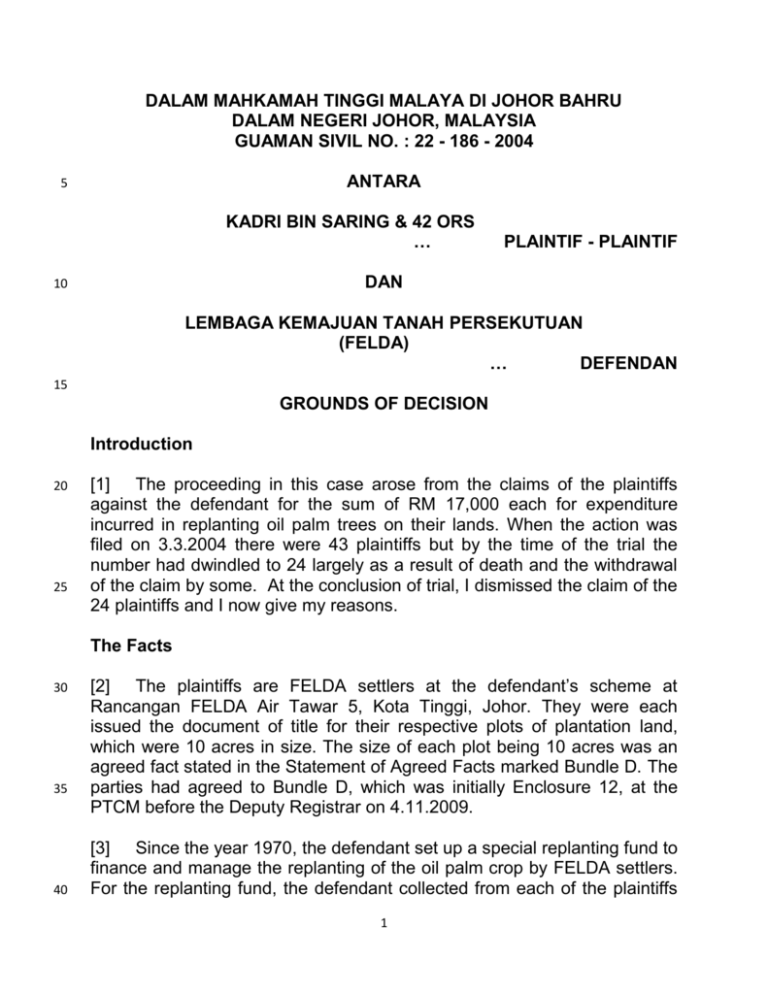
DALAM MAHKAMAH TINGGI MALAYA DI JOHOR BAHRU DALAM NEGERI JOHOR, MALAYSIA GUAMAN SIVIL NO. : 22 - 186 - 2004 ANTARA 5 KADRI BIN SARING & 42 ORS … PLAINTIF - PLAINTIF DAN 10 LEMBAGA KEMAJUAN TANAH PERSEKUTUAN (FELDA) … DEFENDAN 15 GROUNDS OF DECISION Introduction 20 25 [1] The proceeding in this case arose from the claims of the plaintiffs against the defendant for the sum of RM 17,000 each for expenditure incurred in replanting oil palm trees on their lands. When the action was filed on 3.3.2004 there were 43 plaintiffs but by the time of the trial the number had dwindled to 24 largely as a result of death and the withdrawal of the claim by some. At the conclusion of trial, I dismissed the claim of the 24 plaintiffs and I now give my reasons. The Facts 30 35 40 [2] The plaintiffs are FELDA settlers at the defendant’s scheme at Rancangan FELDA Air Tawar 5, Kota Tinggi, Johor. They were each issued the document of title for their respective plots of plantation land, which were 10 acres in size. The size of each plot being 10 acres was an agreed fact stated in the Statement of Agreed Facts marked Bundle D. The parties had agreed to Bundle D, which was initially Enclosure 12, at the PTCM before the Deputy Registrar on 4.11.2009. [3] Since the year 1970, the defendant set up a special replanting fund to finance and manage the replanting of the oil palm crop by FELDA settlers. For the replanting fund, the defendant collected from each of the plaintiffs 1 RM 3.34 per acre on monthly basis until 1984 and at RM 4 commencing from June 1985. Instead of the plaintiffs having to pay in cash, the contributions were deducted from the proceeds of the yield of the plantation lands of the plaintiffs. 5 10 [4] On 17.7.2003, the 1st plaintiff (PW1) on behalf of the plaintiffs wrote to the defendant the letter at p.207 of agreed Bundle B (Part B) whereby he asked for the release and payment of RM 17,000 to each plaintiff from the replanting fund. The plaintiffs stated that they were entitled to the monies because they had replanted oil palm crop on their plots of land on their own and they have settled all the dues to FELDA that had enabled them to obtain the title deeds. When they did not get any response from the defendant, PW1 wrote a follow up letter of 24.8.2003 (p.208 Bundle B (Part B)) to once again ask for payment of the RM 17,000. 15 20 25 30 [5] By a letter dated 16.9.2003 (at page 211 of Bundle B (Part B)) the defendant wrote to PW1 to inform that FELDA had determined that the task of replanting would now be managed by its subsidiary company Felda Agricultural Services Sdn Bhd (FASSB). Commencing from the year 2002 any settler who chose to replant oil palm trees on his own would no longer be given any form of payment especially from the replanting fund. In response, the solicitors for the plaintiffs wrote to the defendant by letter of 17.12.2003 (pp 220 - 221 of Bundle B (Part B)) to state that the plaintiffs had started replanting works in the year 2001 and as such would not be denied the right to get back their monies from the replanting fund. The plaintiffs had chosen to replant by themselves without going through the defendant because they no longer desired to enter into a replanting management agreement with the defendant that they claimed had caused them to be indebted to the defendant in the past. Moreover, since the plaintiffs had paid the contributions into the replanting fund and had paid the dues, the monies in the replanting fund belonged to them the defendant merely holding it in trust for them. The Claim of the Plaintiffs 35 40 [6] By their Statement of Claim, the plaintiffs contended that since they had started replanting works in 2001, they should not be denied the right to the monies under the replanting fund, which was held in trust by the defendant. In the alternative, even if the plaintiffs commenced replanting in the year 2002, they had a legitimate expectation to be entitled to the 2 5 10 15 monies in the replanting fund for 2 reasons. Firstly, FELDA settlers in the defendant’s scheme at FELDA Air Tawar 1 and 2, Kota Tinggi that had chosen to replant on their own were each paid RM 17,000 from the replanting fund. Secondly, the Minister of Land and Cooperative Development Tan Sri Kasitah Gadam and the Chairman of FELDA have made statements and assured settlers such as the plaintiffs who have chosen to replant by themselves they would be paid a sum of RM 17,000 each from the replanting fund. The defendant’s conduct in depriving the plaintiffs of their right to the monies is discriminative of them and was unconstitutional as it contravened Articles 5 (1) and 8 (1) of the Federal Constitution. Further, the plaintiff’s were not given the right to be heard or consulted before the defendant appointed FASSB to fully manage the replanting. Their interests would not be guaranteed given that they did not have any shares in FASSB. Hence, such appointment of FASSB was not valid, null and void. Further still, the defendant’s conduct in preventing the plaintiff’s from obtaining the RM 17,000 from the replanting fund was abusive and oppressive. The plaintiffs were forced to incur expenses to carry out the replanting works and therefore, the plaintiffs ought to be compensated with exemplary and aggravated damages. 20 [7] The plaintiffs by their Statement of Claim therefore claimed for the following : (a) 25 (b) 30 (c) (d) 35 (e) (f) a declaration that the plaintiffs are entitled to replant on their own without going through the defendant and entitled to the sum of RM 17,000 each as expenditure incurred for replanting; a declaration that the act of the defendant in prohibiting or refusing the payment of RM 17,000 from the replanting fund to the plaintiffs is null and void and unconstitutional; an order that the defendant pay the sum of RM 17,000 from the replanting fund to each plaintiff within 7 days from the date of the court order on the writ; a declaration that the act of the defendant in determining that all replanting works must be done by FASSB is invalid, void and of no effect; an order for exemplary and aggravated damages; and costs. 40 3 The Defence 5 10 [8] The plaintiffs when joining the FELDA scheme had entered into a written agreement. By clause 9 of the agreement, all payments made by settlers into the replanting fund shall be administered and managed by the defendant. Only the defendant was allowed to expand or use the monies in the replanting fund. [9] The payments that the plaintiff made into the replanting fund was calculated according to Schedule 1 of the agreement and deductions could only be made if there was money available in the settlers account. The defendant denied that the contributions of the plaintiffs into the replanting fund amounted to RM 17,000 each. As such, the plaintiffs were not entitled to the monies. 15 20 25 30 35 [10] The monies in the replanting fund could only be taken out based on guidelines applicable at the material time and those governing guidelines did not allow for the release of the monies to the settlers. Moreover, before monies in the fund could be released, there must be proof of expenditure by the plaintiff and compliance with the rules and practices applicable to replanting. [11] In the event any settler chose to replant on his own and it was done satisfactorily, the defendant may pay to the settler a sum not exceeding RM 850 per acre. This was to be released progressively based on the works carried out, the expenditures incurred and after the defendant had ascertained that the replanting works was carried out in compliance with the existing practices and procedure. The plot would then have to be delivered to the defendant to carry out land rehabilitation for which a further sum of RM850 per acre would be used by the defendant. For this purpose, the plaintiffs were required to contact the defendant’s office in Johor Bahru. [12] The plaintiffs had carried out their replanting works from the year 2002. However, they did not comply with the replanting practice. Consequently, the defendant had to carry out remedial works and the defendant had to provide the monies for that purpose. The defendant therefore denied the plaintiffs’ claim. 40 4 The Issues for Determination [14] From the pleadings, the evidence adduced at the trial and the submissions of learned counsels the issues before the court were : 5 (a) (b) 10 (c) (d) 15 whether the plaintiffs were entitled to claim the sum of RM17,000 from the replanting fund if they replanted the oil palm trees by themselves; whether the plaintiffs have satisfied the requirements for the payment of the RM 17,000; whether the act of the defendant in refusing to pay the plaintiff RM 17,000 was discriminatory and arbitrary thus offending Articles 5(1) and 8 (1) of the Federal Constitution, and whether the defendant’s conduct in preventing the plaintiffs from obtaining the RM 17,000 from the replanting fund was abusive and oppressive such that the plaintiffs ought to be compensated with exemplary and aggravated damages. The Evidence 20 25 30 35 [15] The 1st plaintiff (PW1) was the first witness to give evidence for the plaintiffs. After he testified the parties came to agreement that his evidence would be adopted by the rest of the plaintiffs except in so far as it pertained to evidence of payments that were made to him. Further, the parties agreed for the 36th plaintiff (PW2) to take the stand in order for him to be crossexamined on the sole issue of whether he had done any replanting. The defendant called 2 witnesses. Whether the plaintiffs were entitled to claim the sum of RM 17,000 if they replanted by themselves [16] The evidence of this came from DW1. He is Encik Hussin bin Ali, the Director of FELDA. After much hesitancy in admitting the point, he came around under cross-examination and admitted that FELDA had determined the amount of RM 1,700 per acre for those who replanted before 2002. The relevant excerpt of the cross-examination of DW1 is as follows : Q: 40 A: But you agree that FELDA has fixed the amount of RM1700 per acre for those who replanted before 2002 ? Yes I agree. 5 5 10 15 20 [17] The document at page 1 of Bundle C 1 was then referred to DW1. Bundle C 1, by the way, is an agreed Bundle of Documents produced by the defendant for the trial. The parties at the start of the trial had agreed for it to be a Part A bundle agreed on authenticity and content. Page 1 of Bundle C 1 is a circular of the defendant dated 1.6.2006 and its paragraph 3 reads thus : “Bagi peneroka yang terlibat menanam semula sendiri pada program tanam semula sesuatu rancangan sebelum tahun 2002, Felda telah menetapkan tarikh terakhir untuk menuntut bayaran RM1,700.00 seekar ialah pada 31 Disember 2003.” [18] The cross-examination of DW1 on paragraph 3 of the circular went like this : Counsel : Yesterday you agree before 2002 FELDA fixed RM1700 per acre to be paid to those who replanted the trees themselves. Refer page 1 of C 1 paragraph 3 to witness. Read first sentence. DW1 : I agree by this those who replanted before 2002 are entitled to RM1700 per acre and they must claim before 31.12.2003. Yes if these 2 requirements are met they are entitled. 25 30 Hence, there was incontrovertible evidence that the defendant had determined that for those settlers (including the plaintiff) that had replanted by themselves before 2002 they were entitled to claim RM1700 per acre. This amounted to RM17000 for each plaintiff because each owned 10 acres of land. Did the Plaintiffs fulfill the requirements for the payment of the RM 17,000 ? 35 40 [19] DW1 agreed that by the circular of 1.6.2006 (p1 Bundle C 1) if the plaintiffs met the 2 requirements, they would be entitled to make a claim for the RM 1,700 per acre. The 2 requirements were : (i) that they put in their claim before 31.12.2003 and (ii) that they had replanted before 2002. 6 5 Learned counsel for the plaintiffs contended that based on the explicit concession from DW1, the duty of the court was only to ascertain whether the plaintiffs in this case have satisfied the 2 requirements. I agreed with that. Did the plaintiffs put in their claim before 31.12.2003 ? 10 [20] The plaintiffs made their claim for the RM 17,000 from the replanting fund by means of 4 letters and all were written before 31.12.2003. The first of such letters was dated 26.6.2003 produced at page 210 of Bundle C Part B. PW1 said he drafted this letter. The letter was addressed to the manager of FELDA Scheme of Air Tawar 5, Kota Tinggi. At the bottom of the letter, the manager had signed to acknowledge receipt on 26.6.2003 at 3.00 p.m. 15 20 [21] The second letter was dated 17.7.2003 (at page 207 of Bundle C Part B) and it was signed by the 1st plaintiff. By this letter, the plaintiffs had asked for the release of RM 17,000 replanting money to them. The defendant by their reply letter of 16.9.2003 (at pp 211-212 Bundle C Part B) explicitly acknowledged receiving this letter. 25 [22] The next letter was dated 24.8.2003 (at page 208 of Bundle C Part B) signed by the 1st plaintiff and it is a follow up to the letter of 17.7.2003. The plaintiffs once again asked the defendant to pay them the sum of RM17000. The defendant did not deny receiving this letter in their defence. 30 35 [23] The last letter was the letter dated 17.12.2003 (at page 220-221 Bundle C Part B) from the plaintiffs’ solicitors to the defendant which demanded payment of RM 17,000 replanting money to each plaintiff failing which court action would be initiated without further notice. There was no dispute that the defendant received this letter. [24] Clearly then, from these 4 letters, the plaintiffs had made their claim for the sum of RM 17,000 each from the replanting fund before 31.12.2003 and had therefore met the first requirement of the circular of 1.6.2006. Did the plaintiffs replant before 2002 ? 40 [25] By paragraph 11 of the Statement of Claim it was the pleaded case for the plaintiffs that they started replanting in the year 2001. It is 7 fundamental that he who wishes the court to believe in the existence of any particular fact bears the burden of proof (section 103 Evidence Act 1950). 5 [26] There was no evidence forthcoming on the fact of the year of replanting save for the statements of PW1 and PW2 in their respective witness statements that replanting commenced in the year 2001. However, the evidence of PW2 on this was all but demolished in cross-examination when he admitted that he had not yet cut and fell the trees on his plot for purposes of replanting. His cross-examination went like this : 10 Q: A: Q: 15 Have you cut and fell all the trees in your lot for replanting ? No. This means all the trees planted by the defendant are still on your lot ? A : Yes. Put : You have not complied with the requirement of cutting and felling all the old trees as required by the defendant. A : I disagree. 20 This was an admission by PW2 (36th plaintiff) that even at the time of the trial, he had yet to cut and fell all the trees that were originally planted by the defendant on his plot of land. That being the case, there was no question of him having replanted let alone in the year 2001. 25 [27] As for PW1, his evidence did not hold either. In the first place, he did not produce receipts of purchases for replanting or any other tangible proof of replanting in the year 2001. He said without elaborating that he had lost the receipts. Secondly, he agreed that in the year 2001 he did not give any notice to the defendant that he was going to commence replanting on his own. He might have thought it was unnecessary to give notice, but at the same time, it did not make sense for him not to have informed the defendant considering the enormity of the task for a man of his circumstances and that he was going to make a claim. The irresistible inference is that he did not do replanting in 2001 and that was why there was no such notice. 30 35 [28] Added to that, there was evidence adduced at the trial that PW1 had in fact made a claim for payment for replanting done in the year 2002 and not 2001. The evidence came about in this manner. The defendant’s 8 circular of 1.6.2006 (at page 1 of Bundle C 1) was referred to earlier. Paragraphs 2 and 3 read as follows : “2. 5 3. 10 15 20 25 30 35 Surat Pekeliling TPB-Operasi Bil. 4/2004 dan Pekeliling Bil. 2/2005 telah menyatakan bayaran tanam semula sendiri kepada peneroka yang terlibat dalam program tanam semula bermula tahun 2002 dan tahun seterusnya akan di bayar sebanyak RM850.00 seekar.” Bagi peneroka yang terlibat menanam semula sendiri pada program tanam semula sesuatu rancangan sebelum tahun 2002, Felda telah menetapkan tarikh terakhir untuk menuntut bayaran RM1,700.00 seekar ialah pada 31 Disember 2003. Selepas dari tarikh tersebut peneroka akan dibayar RM850.00 seekar sama seperti peneroka yang disebut dalam pekeliling Bil. 4/2004 dan Bil. 2/2005 di atas. Baki wang selebihnya akan diguna untuk menampung sebahagian bayaran kos pembangunan penanaman semula seterusnya jika peneroka menyertai tanam semula bersama Felda di masa akan datang.” [29] It is not in dispute that the form at page 6b of Bundle C 1 is the form that comes with the circular to be filled by those who apply for payment for replanting on their own. The defendant produced Exhibit D.1 without objection during the cross-examination of PW1. Exhibit D.1 is the form found at page 6b of Bundle C 1 that had been filled and signed. Although PW1, under cross-examination, would not admit he submitted D.1, he admitted to signing at the 1st page and to receiving the amount of RM 7,590.04 that is stated on the 2nd page. He as well admitted to being able to understand the contents of D.1 as it was all in Bahasa Malaysia. Moreover, in re-examination when asked concerning D.1 he said he made application for monies to fell trees and not replanting. In saying that he was admitting to having made the application. For these reasons, I did not believe him when he said he did not submit exhibit D.1. Instead, I found it established on balance of probabilities that he filled and submitted D.1. Going by the first page of D.1, PW1 submitted a claim for RM 850 on 20.5.2008 and going by the 2nd page of D.1 at the column “Program Tanam Semula” the year stated therein is 2002. This meant that PW1’s claim was for RM 850 for replanting done in the year 2002. This contradicted his evidence and case for the plaintiffs that replanting was done in 2001 or before 2002. 40 9 [30] Having represented via exhibit D.1 that he replanted in 2002, PW1 compounded matters when he said in re-examination that he in fact made application for monies to fell trees and not for replanting. The reexamination went like this : 5 Counsel: Q : 10 A Q : : A Q: : : A : 15 20 25 30 35 Refer to exhibit D.1. Based on this D.1 you confirmed you received RM7590.40. Yes. Is there any letter from the defendant saying that if you received this amount you are barred from claiming the original claim of RM 17,000.00. None. Why did you accept this amount of RM 7,590.40 from the defendant ? Actually I did not know because actually I made application for monies to fell trees and not for replanting. His statement that he actually made application for monies to fell trees and not for replanting, throws his whole evidence into disarray. In the first place, it could not have been that he thought he was making application to fell trees and not for replanting when the first page of exhibit D.1 which he admitted to signing and the contents understood clearly stated it is an application for “BAYARAN TANAM SEMULA SAWIT (Tuntutan Kerana Telah Menyiapkan Kerja Tanam Semula Sawit Bayaran Adalah Mengikut Kerja Disahkan Sehingga Siap Tanam Sahaja).” Column B of the form then sets out in table form the various stages of works done beginning with felling of the trees and right to the stage of maintenance of the crop like applying pesticide. Therefore, it was absurd for him to have said he was merely making application to fell trees. [31] In any case, by saying in re-examination that he was applying for monies to fell trees and not for replanting, he was holding out that he in fact had not even fell the trees at the time of signing exhibit D.1 on 20.5.2008 let alone replanting. If he had not even fell the trees, then he had no business going to court saying that he had replanted in 2001 and entitled to RM 17,000 from the replanting fund. 10 [32] The state of the evidence of PW1 being such, it could not sustain the case of the plaintiffs that replanting was done in the year 2001. 5 10 15 20 25 30 35 [33] Learned counsel for the plaintiffs contended that actually the evidence of replanting in 2001 came from the letters that the plaintiffs wrote to the defendant. Learned counsel said that in the letter of 17.7.2003 (page 207 Bundle C) the plaintiffs categorically stated therein that a section of the trees have flowered and a section have fruited and ripen. In the letter of 25.8.2003 (at page 208 of Bundle C) the plaintiffs were also categorical that the age of a section of the trees was more than 2 years. Learned counsel submitted that the age of the trees indicate that replanting was done before 2002. In their solicitors’ letter of 17.12.2003 (pages 220 - 221 of Bundle C) the plaintiffs specifically asserted that they started replanting in the year 2001. According to learned counsel, the defendant neither replied nor rebutted this last letter. [34] With respect, I did not see how it could be said that the assertions in the letters could amount to proof of replanting. By virtue of section 103 of the Evidence Act 1950, the plaintiffs had a burden to discharge and it was to prove that replanting was done in the year 2001. They could not hope to merely rely on their bare assertions in the letters to discharge this burden. They must produce evidence in court to prove the assertions in the letters. In court, all they had was the evidence of PW1 and PW2, which, as has been demonstrated above, was of no assistance at all. Instead, PW2’s evidence that he had not even done any felling of the old trees on his plot completely contradicted the assertions in the letters of replanting having been done and the trees of a certain age. PW1’s evidence was not up to the mark either as he appeared to say he replanted in 2002 yet saying he had yet to fell the trees which was wholly contradictory. Whichever of the contradictory stance he took in court one takes, it was still a contradiction of the assertions in the 3 letters of having replanted before the year 2002. [35] In any event, the truthfulness of the assertions in these 3 letters was completely debunked by the evidence of PW1 in court. With regard the solicitors’ letter of 17.12.2003 (pages 220-221 of Bundle C) the following is the excerpt of the cross-examination of PW1 pertaining to it : Counsel 40 : Refer witness to lawyer’s letter at page 220 - 221 of Bundle C. Last paragraph at page 220 and first paragraph at 221. Read. After receiving the 11 A Put : : A : 5 10 15 Here we have PW1 literally admitting to conjuring up the year 2001 in order to make a claim. This was an outrageous claim yet during re-examination, there was no attempt to clarify or explain it. Since it was PW1’s admission that he instructed the solicitors to put in the year 2001 in the letter of 17.12.2003 to suit his convenience, it goes without saying that the assertion in the letter is rendered meaningless. [36] With regard the letter of 17.7.2003 (page 207 Bundle C) the reexamination of PW1 went like this: Counsel Q : : 20 Miss Doshi : 25 Mr. Hanipa : Q : 30 A 35 40 letter at page 211-212 you instructed your lawyer to inform the defendant that you replanted in 2001. Yes. The year 2001 was put to suit your convenience so that you can make a claim. Yes I agree. : Refer to the letter at page 207 of Bundle C. You agreed based on this letter it was not mentioned you started the replanting in 2001. Can you from this letter establish that the replanting was done in 2001? Object to the line of questioning because my learned friend is putting words in his mouth. Secondly, I did not ask him to establish what is in the letter. I just ask him that he did not mention it there. I rephrase. Based on this letter can you establish the replanting was done in 2001? Based on point (bullet) number 4 I stated that part of the trees have flowered and part have fruited and ripened. Usually it takes 3 years for the trees to bear flowers and fruit and ripen. The letter is dated 17.7.2003 but now the trees have flowered and fruited and ripened and that means they were planted in 2001. [37] Going by the evidence of PW1, if the trees take 3 years to flower, fruit and ripen we will have to do some backtracking by 3 years from the date of 12 5 10 15 20 25 30 35 40 the letter to get to the date of replanting. The date of the letter is 17.7.2003, and if one backtracks 3 years, replanting would have taken place in July of 2000. This of course did not tie up with the case of the plaintiffs that replanting was done in 2001. Going also by the evidence of PW1 that the trees took 3 years to flower, fruit and ripen, if replanting was done on 17.7.2001 (based on the date and month of the letter) then the trees would only bear flowers, fruit and ripen by 17.7.2004. However, in the letter we have PW1 asserting that the trees had already flowered, fruited and ripen in July of 2003. There still is a serious discrepancy here. Hence, the assertion of PW1 in this letter that the trees have flowered, fruited and ripen did not assist the case for the plaintiffs that replanting was done in the year 2001 or before 2002. [38] For the reasons stated above, I found that the plaintiffs had not proven on balance of probabilities that they replanted in the year 2001 or before the year 2002. That meant they failed to prove they have fulfilled the 2nd requirement. [39] Following from the failure of the plaintiffs to prove that they had met both requirements of payment, I could not come to any finding other than that they were not entitled to the payment of RM 17,000 each that they claimed. Whether in any event the act of the defendant in refusing to pay the plaintiff RM17000 was discriminatory and arbitrary thus offending Articles 5(1) and 8 (1) of the Federal Constitution [40] Learned counsel for the plaintiffs argued that the act of the defendant in refusing to pay the plaintiffs RM 17,000 was a discriminatory and arbitrary act thus offending Articles 5(1) and 8 (1) of the Federal Constitution. He gave 3 reasons for saying so. [41] Firstly, evidence was adduced at the trial that the defendant gave some settlers namely the settlers of Felda Air Tawar 1, who are the plaintiffs’ neighbours, replanting money in the sum of RM 1,700 per acre. DW1 testified in court that the defendant made payments to the settlers in Felda Air Tawar 1 because they had replanted on their own before 1.1.2002. Learned counsel for the plaintiffs contended that since the plaintiffs had also replanted on their own before the year 2002, there was no valid reason why they were discriminated against. 13 5 10 15 20 25 [42] The simple answer to this argument was that the defendant made payments to the Air Tawar 1 settlers because they replanted on their own before 1.1.2002. If the plaintiffs could prove in court that they also had replanted before 1.1.2002, then one could say they had been discriminated against when they did not get any such payment. However, as we have seen, the plaintiffs were unable to prove on balance of probabilities that they had replanted before the year 2002. Hence, the similarity in circumstances between them and the Air Tawar 1 settlers that met with different treatment from the defendant was not established. It goes without saying that the plaintiffs had failed to prove any discriminatory act here. [43] The plaintiffs contended that secondly, even assuming that the plaintiffs started replanting in 2002, Article 8 (1) does not allow the defendant to discriminate against the plaintiffs. This is because all the settlers in all the FELDA schemes are from the same class of persons and have contributed to the replanting fund and to be treated equally. [44] To my mind, the point made here that the plaintiffs are not allowed to claim even if they started replanting in the year 2002 is no longer true because of the provisions of the circular of 1.6.2006 (page 1 of Bundle C 1). Paragraphs 2 and 3 of the circular stipulate that those settlers that have replanted on their own from the year 2002 are entitled to payment of RM 850 per acre. This was the reason we saw how PW1 was able to make a claim by submitting the form D.1 wherein he stated he replanted in the year 2002 and was paid the sum of RM7590.04. I therefore found no basis for the plaintiffs saying that they were discriminated against even if they had planted in the year 2002. 35 [45] Thirdly, the plaintiffs said it did not make sense for the defendant to allow those that have replanted through FELDA in the years 2001, 2002, 2003 and 2004 to utilize the replanting fund in the sum of RM 1,700 per acre whereas those who did replanting on their own are denied the same. Learned counsel for the plaintiffs relied on the case of Tan Tek Seng @ Tan Chee Meng v Suruhanjaya Perkhidmatan Pendidikan & Anor [1996] 2 CLJ 771 where Gopal Sri Ram JCA held as follows : 40 “If a particular procedure prescribed by written law is found to be arbitrary or unfair or the procedure adopted in a given case is held to be unfair, then generally speaking, it must be struck down as offending art. 5 (1) read with art. 8 91).” 30 14 5 10 15 20 25 30 35 [46] The answer to this is simply that the settlers are given the choice whether to sign the agreement to replant through FELDA. If they choose to replant through FELDA then they sign the agreement, which allows for the sum of RM 1,700 per acre. To my mind, there is nothing unfair about this because the settlers including the plaintiffs are given the choice. [47] Moreover, for those who choose not to replant through FELDA as the plaintiffs have done, the guidelines applicable are Bundle C 1 and C 2. DW1 gave evidence that is not disputed that all that was required of them was to fill the requisite forms and then comes inspection to ensure that replanting was carried out after which payment would be certified and made. The difference is that the maximum payment in cash allowed per acre is RM850. This did not mean that was all that each settler is entitled to. DW1 gave evidence, which is not disputed, that the balance will be paid in kind i.e. in terms of agricultural output. As such, there is no basis for the plaintiffs saying that those that replant on their own are denied the sum of RM1700 and are discriminated against. The balance is made for in kind. I therefore did not find the procedure or guidelines prescribed for those who replanted on their own to be arbitrary or unfair in the manner spoken of in the case of Tan Tek Seng @ Tan Chee Meng v Suruhanjaya Perkhidmatan Pendidikan & Anor, supra. [48] For the reasons stated above, the plaintiffs failed to prove that the defendant had acted in contravention of Articles 5(1) and 8 (1) of the Federal Constitution in not making the payment of RM17000 to the plaintiffs. Whether the defendant’s conduct was abusive and oppressive such that the plaintiffs ought to be compensated with exemplary and aggravated damages [49] The plaintiffs failed to prove that they have met the requirements for the payment of the RM 17,000 to them. Further, they failed to prove that the act of the defendant in refusing to pay them the money was discriminatory and arbitrary or offensive to Articles 5(1) and 8 (1) of the Federal Constitution. Thus, there was no question of it having been proved that the conduct of the defendant was abusive and oppressive. I therefore dismissed the claim of the plaintiffs to be compensated with exemplary and aggravated damages. 40 15 Conclusion 5 10 [50] The plaintiffs desired the court to give judgment for them in the sum of RM 17,000 each for expenses incurred in replanting oil palm trees on their own on their plots of land. The plaintiffs claim they were entitled to the monies and the defendant had acted arbitrarily and with discrimination in refusing to pay them. As we have seen and for the reasons stated, the plaintiff did not come to proof that they were entitled to such payments or that the defendant had acted in the manner alleged. For that reason, the claim of the plaintiffs along with the prayers for declaratory relief were dismissed with costs. 15 SUPANG LIAN Judicial Commissioner High Court Malaya Johor Bahru 20 Dated : 20 August 2010 25 Counsels Mr. Mohamed Hanipa of Tetuan Mohamed Hanipa & Associates, Advocates & Solicitors for the plaintiffs. Miss J. Doshi of Tetuan Abdullah & Zainuddin, Advocates & Solicitors for the defendant. 16
